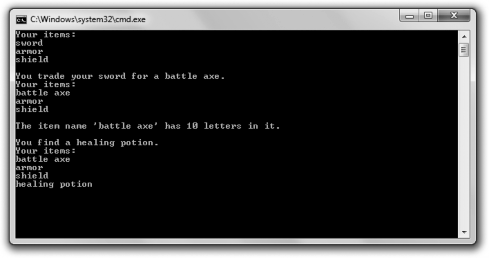
< Previous | Contents | Next >
Introducing the Hero’s Inventory
The Hero’s Inventory program maintains the inventory of a hero from a typical RPG. Like in most RPGs, the hero is from a small, insignificant village, and his father was killed by an evil warlord. (What’s a quest without a dead father?) Now that the hero has come of age, it’s time for him to seek his revenge.
In this program, the hero’s inventory is represented by an array. The array is a sequence of string objects—one for each item in the hero’s possession. The hero trades and even finds new items. Figure 3.4 shows the program in action.
You can download the code for this program from the Course Technology website (www.courseptr.com/downloads). The program is in the Chapter 3 folder; the filename is heros_inventory.cpp.

Figure 3.4
The hero’s inventory is a sequence of string objects stored in an array.
// Hero’s Inventory
// Demonstrates arrays
#include <iostream> #include <string>
using namespace std; int main()
{
const int MAX_ITEMS = 10; string inventory[MAX_ITEMS];
int numItems = 0; inventory[numItems++] = "sword"; inventory[numItems++] = "armor"; inventory[numItems++] = "shield";
cout << "Your items:\n";
for (int i = 0; i < numItems; ++i)
{
cout << inventory[i] << endl;
}
98 Chapter 3 n For Loops, Strings, and Arrays: Word Jumble
cout << "\nYou trade your sword for a battle axe."; inventory[0] = "battle axe";
cout << "\nYour items:\n";
for (int i = 0; i < numItems; ++i)
{
cout << inventory[i] << endl;
}
cout << "\nThe item name ’" << inventory[0] << "’ has "; cout << inventory[0].size() << " letters in it.\n";
cout << "\nYou find a healing potion."; if (numItems < MAX_ITEMS)
{
inventory[numItems++] = "healing potion";
}
else
{
cout << "You have too many items and can’t carry another.";
}
cout << "\nYour items:\n";
for (int i = 0; i < numItems; ++i)
{
cout << inventory[i] << endl;
}
return 0;
}